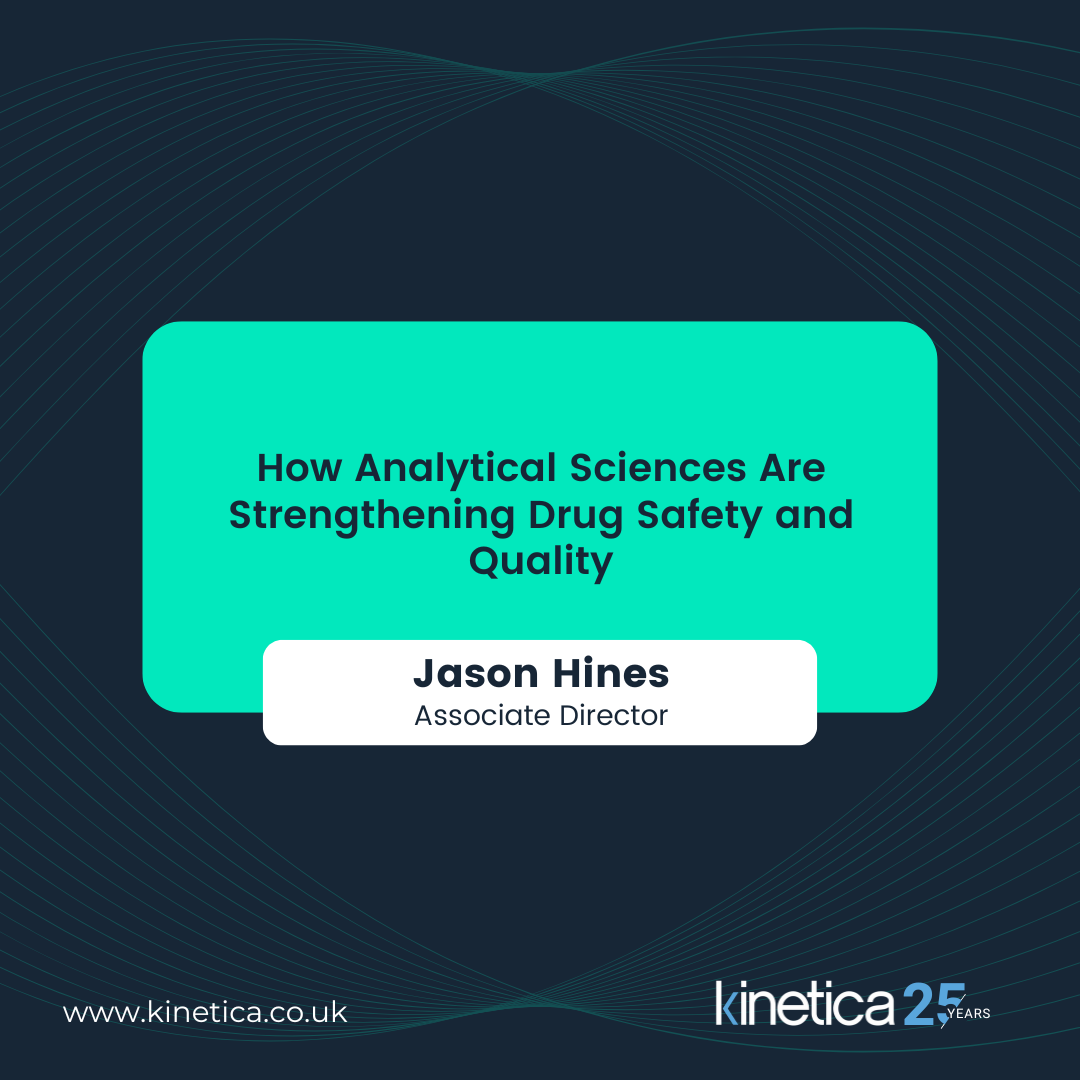
INSIGHTS
The latest insights & news from Kinetica
How Analytical Sciences Are Strengthening Drug Safety and Quality
12 Mar, 20255 MinutesIntegration of Artificial Intelligence in Analytical Processes In the rapidly evol...

Integration of Artificial Intelligence in Analytical Processes
In the rapidly evolving pharmaceutical industry, analytical sciences are advancing beyond conventional methodologies, incorporating new technologies to improve drug safety and quality. These advancements are essential for professionals managing the complexities of modern pharmaceutical development and manufacturing.
Artificial Intelligence (AI) is transforming pharmaceutical analytics by enabling the processing of extensive datasets to identify patterns and predict outcomes with higher accuracy. The global AI in healthcare market is projected to reach $188 billion by 2030, reflecting a compound annual growth rate (CAGR) of 37% from 2022. This rapid growth highlights AI’s increasing role in refining analytical methodologies.
AI-driven platforms facilitate predictive modelling in quality control, allowing for real-time adjustments during manufacturing. Machine learning algorithms can forecast potential deviations in production, enabling proactive corrections and reducing batch failures. This approach not only improves product quality but also optimises operational efficiency.
Advancements in Spectroscopic Techniques
New spectroscopic methods are improving the accuracy of pharmaceutical analysis. Techniques such as Raman imaging and infrared spectroscopy are being used to identify molecular compositions and detect contaminants at trace levels. These non-destructive methods allow for comprehensive testing while maintaining sample integrity.
The adoption of terahertz frequency-domain spectroscopy, combined with quantitative multivariate analysis, has shown effectiveness in inspecting pharmaceutical tablets. This technique enables the assessment of tablet density and active pharmaceutical ingredient (API) concentration with high precision, ensuring uniformity and potency in solid dosage forms.
Implementation of Process Analytical Technology (PAT)
Process Analytical Technology (PAT) is being widely integrated to monitor critical process parameters (CPPs) in real-time. This approach supports immediate quality assessments during production, aligning with regulatory expectations for continuous verification. The use of PAT has been shown to reduce production cycle times and improve product consistency. (FDA)
For example, the application of PAT in biopharmaceutical manufacturing allows real-time monitoring of protein folding and aggregation—key factors affecting therapeutic efficacy and safety. Advanced spectroscopic sensors within PAT frameworks detect conformational changes early in production, ensuring biologically active and safe products.
Market Growth and Economic Impact
The analytical testing services market is expanding rapidly, driven by the increasing complexity of pharmaceutical compounds and regulatory demands. The market was valued at approximately $8.84 billion in 2024 and is projected to reach $16.89 billion by 2033, with a CAGR of 7.64%. This reflects the rising demand for advanced analytical techniques to meet strict safety and efficacy standards.
Jason Hines, Associate Director & Client Director of Industrial Life Sciences at Kinetica, shares his insights:
"With over 20 years in recruitment and a background in biochemistry, I’ve seen first-hand how advancements in analytical sciences are shaping the pharmaceutical industry. The demand for professionals with expertise in advanced analytical techniques—whether in spectroscopy, chromatography, or real-time process monitoring—has never been higher. Companies are seeking talent who not only understand traditional quality control methods but can also navigate the increasing integration of AI, automation, and Process Analytical Technology (PAT) into manufacturing.
One of my proudest moments was partnering with a global client during the Covid-19 pandemic to place individuals working on vaccine manufacturing. That experience underscored the importance of having the right analytical talent in place to meet stringent regulatory standards and ensure drug efficacy at scale. Today, we continue to see an urgent need for specialists who can manage complex analytical workflows and adapt to the ever-changing regulatory landscape.
At Kinetica, we work closely with our clients to identify professionals who bring both technical expertise and problem-solving capabilities, ensuring they are equipped to drive innovation in pharmaceutical analytics. We are committed to providing tailored recruitment solutions that align with the evolving needs of the industry.”
